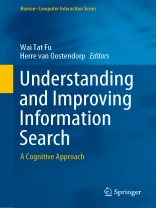This edited book adopts a cognitive perspective to provide breadth and depth to state-of-the-art research related to understanding, analyzing, predicting and improving one of the most prominent and important classes of behavior of modern humans, information search. It is timely as the broader research area of cognitive computing and cognitive technology have recently attracted much attention, and there has been a surge in interest to develop systems and technology that are more compatible with human cognitive abilities.
Divided into three interlocking sections, the first introduces the foundational concepts of information search from a cognitive computing perspective to highlight the research questions and approaches that are shared among the contributing authors. Relevant concepts from psychology, information and computing sciences are addressed. The second section discusses methods and tools that are used to understand and predict information search behavior and how the cognitive perspective can provide unique insights into the complexities of the behavior in various contexts. The final part highlights a number of areas of applications of which education and training, collaboration and conversational search interfaces are important ones.
Understanding and Improving Information Search – A Cognitive Approach includes contributions from cognitive psychologists, information and computing scientists around the globe, including researchers from Europe (France, Netherlands, Germany), the US, and Asia (India, Japan), providing their unique but coherent perspectives to the core issues and questions most relevant to our current understanding of information search behavior and improving information search.
Tabela de Conteúdo
Introduction.- Section I: Foundation and Background.- Challenges for a Computational Cognitive Psychology for the New Digital Ecosystem.- How Cognitive Computational Models can Improve Information Search.- Cognitive Modeling of Age & Domain Knowledge Differences in Information Search.- Section II: Methods and Tools.- An Evolving Perspective to Capture Individual Differences Related to Fluid and Crystallized Abilities in Information Searching with a Search Engine.- Semantic Relevance Feedback on Queries and Search Results for Younger and Older Adults.- Designing Multistage Search Systems to Support the Information Seeking Process.- Search Support Tools.- Eye-Tracking Information Search.- Section III: Areas of Applications.- Children’s Acquisition of Text Search Strategies: The Role of Task Models and Relevance Processes.- Training and Tools to Foster Source Credibility Evaluation During Web Search.- Computer-Supported Collaborative Information Search for Geopolitical Forecasting.- Conversational Interfaces For Information Search












